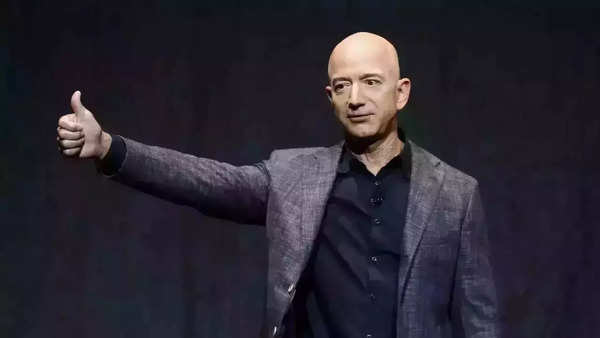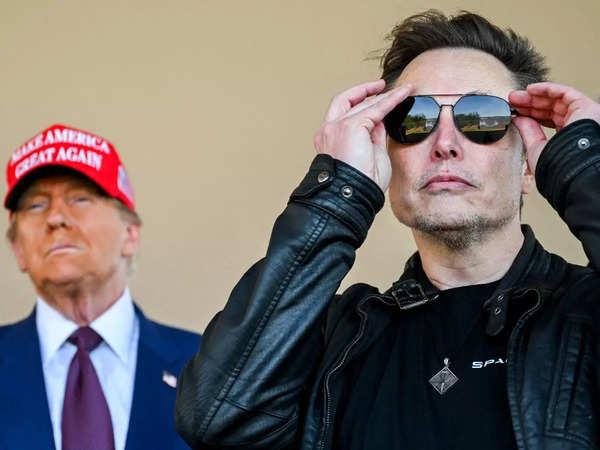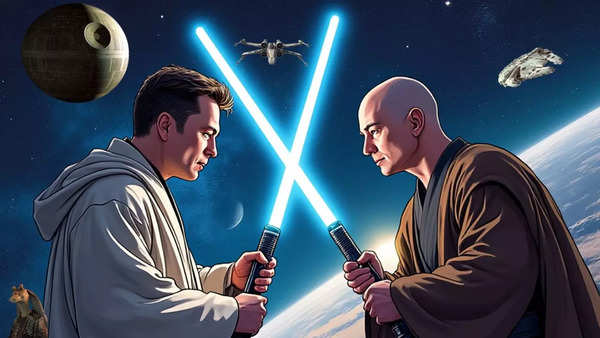
Jeff Bezos and Elon Musk, two of the wealthiest and most influential figures of the modern era, are locked in an epic space race. Their competition transcends ego or wealth—it’s about shaping humanity’s future among the stars. While they share a belief in the necessity of venturing beyond Earth, their approaches, motivations, and visions are vastly different, leading to both groundbreaking achievements and bitter rivalries.
Bezos: Preserving Earth by Moving Industries to Space

Jeff Bezos was criticized as Washington Post announced it would not endorse any presidential candidate this time.
Jeff Bezos, through his aerospace company Blue Origin, envisions a future where humanity’s activities in space serve to protect Earth’s fragile environment. Bezos has championed the concept of relocating polluting industries to space, allowing Earth to become a sanctuary for life.
Drawing inspiration from physicist Gerard K. O’Neill, Bezos imagines enormous space habitats—O’Neill cylinders—that could house millions of people. These rotating structures would allow humans to exploit the vast resources of space while leaving Earth’s ecosystems untouched.
Bezos argues that the increasing energy needs of human civilization require expansion beyond Earth’s finite resources. “There is no Plan B,” he often reiterates. “We have to save Earth.” His vision involves a long-term strategy, with incremental advancements that pave the way for future generations to build sustainable life in space.
Musk: A Spacefaring Civilization to Avoid Extinction

In contrast, Elon Musk, founder of SpaceX, views space as humanity’s ultimate escape hatch. Musk is driven by the belief that Earth is vulnerable to catastrophic events—whether natural or man-made—and that becoming a multiplanetary species is essential for long-term survival.
SpaceX is focused on Mars colonization. Musk’s vision includes terraforming the Red Planet, creating an atmosphere suitable for human habitation. He has suggested extreme methods like detonating nuclear devices over Mars’ poles to release trapped carbon dioxide and warm the planet.
For Musk, time is of the essence. His ambitious timeline includes sending one million people to Mars within the next few decades, a claim met with skepticism by experts. Nonetheless, his passion is undeniable. “Either become a spacefaring civilization or die,” Musk declared, summarizing his existential argument.
A Billionaire Rivalry
The Bezos-Musk rivalry extends far beyond their competing visions; it is personal, competitive, and often public. Walter Isaacson’s biography of Musk recounts the early days of this feud, which began with both men pursuing reusable rocket technology. Musk gave Bezos a tour of SpaceX’s headquarters, expecting a reciprocal visit to Blue Origin, but Bezos declined. Musk, irritated, emailed Bezos to express his frustration.
Their competitive jabs didn’t stop there. When SpaceX landed a craft, Bezos sarcastically tweeted, “Welcome to the club!” In turn, Musk has openly mocked Blue Origin’s slower progress, calling it a “hobby” rather than a serious contender.
The rivalry escalated when the two fought over a NASA launchpad lease, with SpaceX ultimately winning. Later, NASA chose SpaceX over Blue Origin for its Artemis program, the next-generation lunar exploration mission. Bezos challenged the decision in court but lost. Musk, always quick with a quip, claimed his taunts are meant to motivate Bezos: “In some ways, I’m trying to goad him into spending more time at Blue Origin, so they make more progress.”
Beyond the Race: The Real Challenges

While their rivalry grabs headlines, both Bezos and Musk face immense challenges in realizing their dreams:
- Bezos’ Challenges: Building self-sustaining space habitats is a technological and logistical challenge, requiring breakthroughs in food production, energy generation, and life support systems in space.
- Musk’s Challenges: Colonizing Mars involves surviving extreme conditions, including radiation, lack of oxygen, and freezing temperatures. Transporting people and materials across 140 million miles of space also presents enormous hurdles.
Space Race Meets Business Competition
The competition has significant business implications.
- SpaceX: With its reusable rockets and the Starlink satellite network, SpaceX is already a dominant player in the aerospace industry. Its valuation has surged to $350 billion, largely driven by its ability to secure lucrative contracts with NASA and military organizations.
- Blue Origin: While slower to develop, Bezos believes Blue Origin’s potential profitability could eventually surpass that of
Amazon . Its focus onspace tourism and heavy-lift rockets positions it differently than SpaceX but has yet to achieve comparable breakthroughs.
Philosophies in Conflict
At the heart of their rivalry are two competing philosophies:
- Bezos: Space is a tool to save Earth, ensuring that humanity continues to thrive on its home planet.
- Musk: Space is humanity’s destiny, a lifeboat to escape the inevitable demise of Earth.
Who Will Win?
The Bezos-Musk rivalry is more than just a race to space—it’s a contest of ideas that could determine humanity’s trajectory for centuries to come. Whether Bezos succeeds in turning Earth into a paradise by exporting industry to space or Musk achieves his dream of a self-sustaining Martian colony, one thing is clear: the future of humanity will be shaped by the ambitions of these two billionaires. As the battle for the stars rages on, it remains to be seen whose vision will lead humanity into the next great chapter of exploration. For now, the galaxy isn’t big enough for the both of them.






